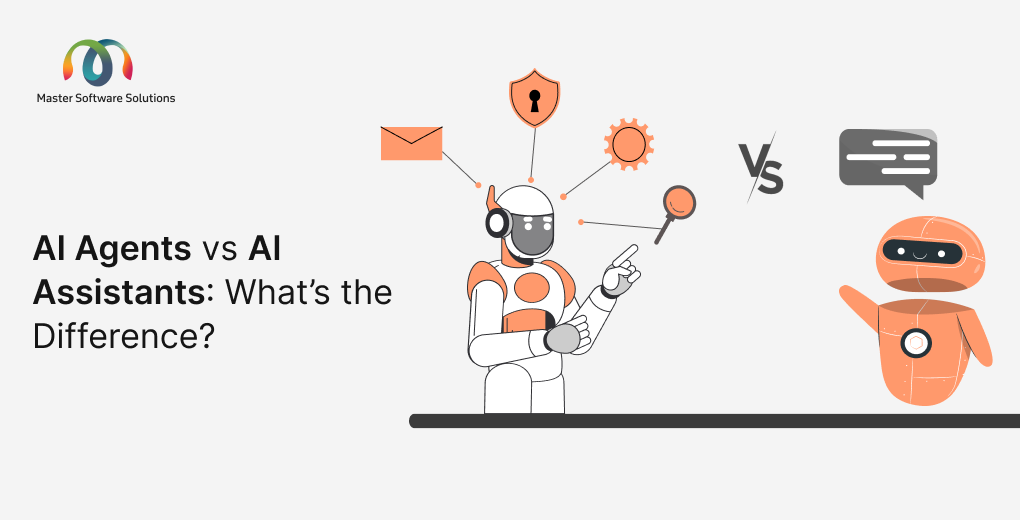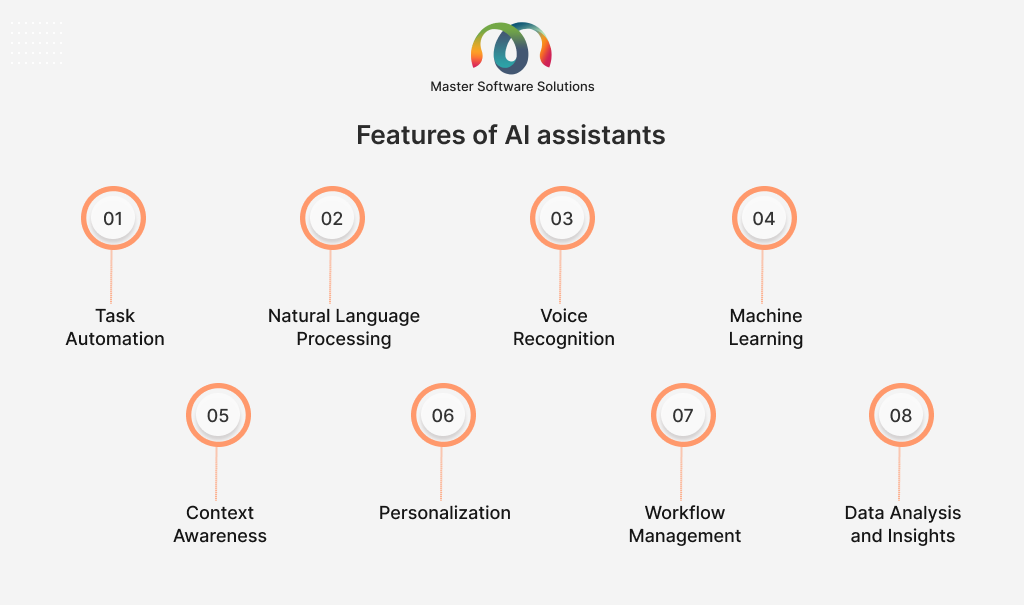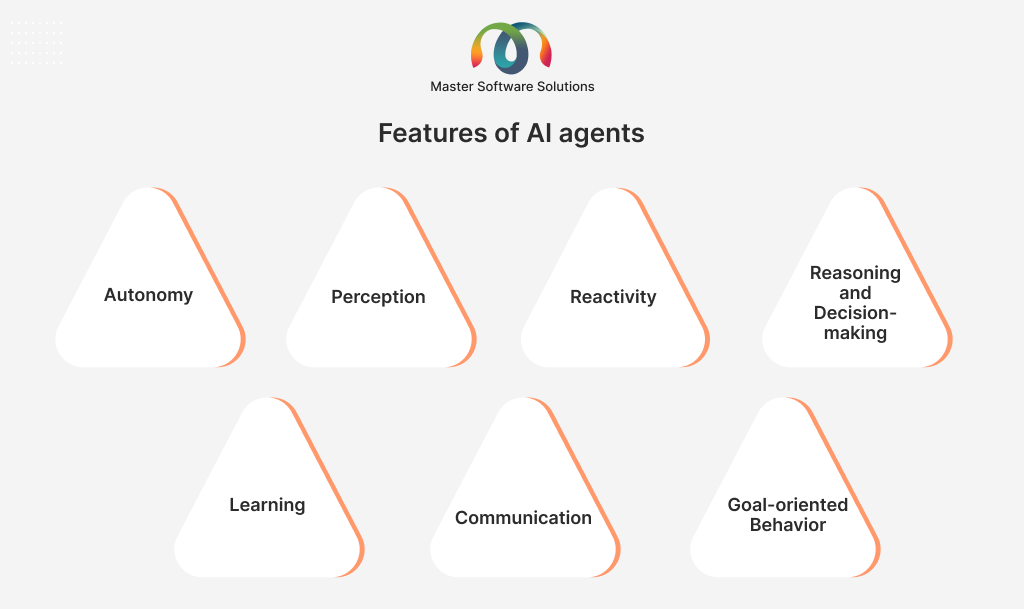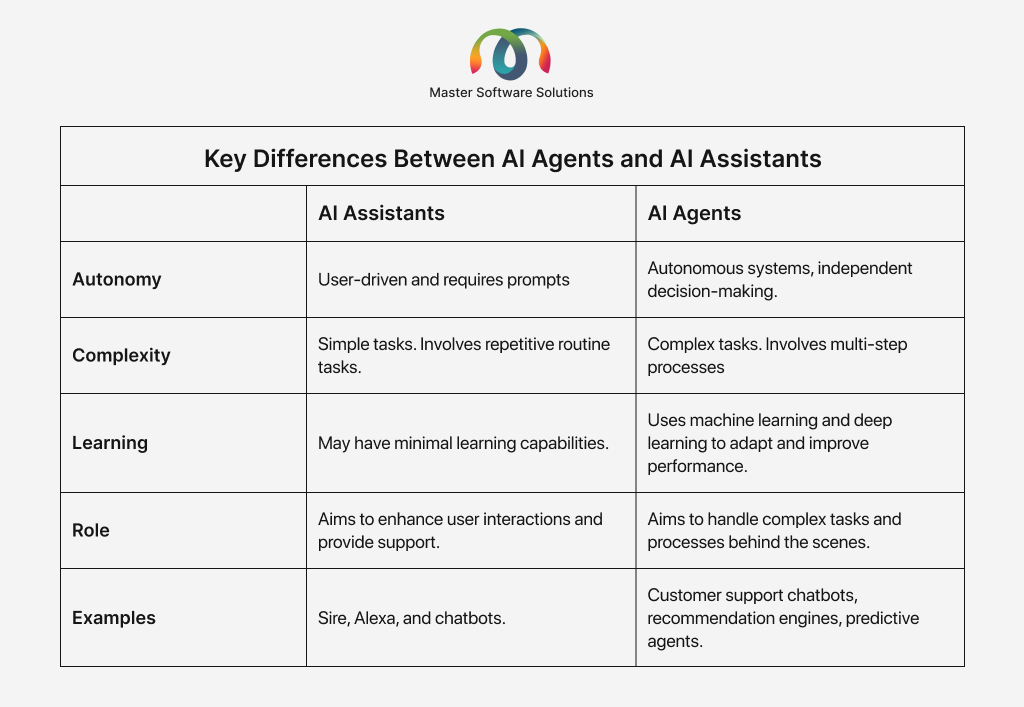Artificial Intelligence (AI) has significantly evolved, leading to the development of various types of systems, especially AI agents and AI assistants. Although these two terms are often used interchangeably, they are different.
This blog aims to understand what AI agents and AI assistants are and the difference between them.
Table of Contents
What are AI assistants?
AI assistants are software programs that use artificial intelligence, natural language processing, and machine learning to understand and respond to the user and perform tasks as requested. The user can interact with them via speech or text, and they are designed to automate and assist with various tasks, including scheduling meetings and providing information.
AI assistants can perform tasks such as dictation, setting reminders, performing calculations, reading text or emails, and providing information and recommendations.
Features of AI assistants
AI assistants offer various features that can handle complex and simple tasks, improving productivity and enhancing customer satisfaction. The features of AI assistants are:
Task automation
AI assistants automate repetitive or routine manual tasks that are time-consuming. The assistant can schedule meetings, set reminders, and even send automated emails.
Natural language processing
This allows you to communicate with an AI assistant in a human way. You can communicate with these assistants like you would chat with your friends. It can comprehend the meaning and intent behind your language.
Voice recognition
This feature enables you to connect with your artificial assistant via voice. The AI assistant can understand what you are saying. It converts your voice into text to process your words and
reply accordingly.
Machine learning
This engine allows AI assistants to learn and improve over time. Analyzing past interactions can help assistants better understand your needs and predict your preferences.
Context awareness
An efficient assistant can understand the context of your request and previous interactions. It can refer to earlier parts of the conversation or consider the current situation.
Personalization
Assistants can customize responses and actions to your individual needs and preferences. This can include learning about your favourite music, common meeting times, and your way of introduction.
Workflow management
Some AI assistants can break down complex workflows into smaller steps, assign tasks, and track progress.
Data analysis and insights
The advanced AI assistants can analyze large amounts of data to identify trends, provide insights, and help you make better decisions.
Benefits of AI assistants
The advanced features of the AI assistant help you save costs, scale, and provide a personalized experience. Assistants are becoming crucial across various industries and for personal use. The benefits of integrating the AI assistants are:
Improved efficiency
Automating repetitive tasks can streamline workflows, freeing human employees to focus on more strategic tasks. This leads to improved resource allocation and efficient time usage.
Enhanced productivity
Your employees can focus on more strategic tasks while assistants can do repetitive and mundane tasks, improving overall productivity. This empowers businesses to achieve more in the same time frame.
24/7 availability
AI assistants are available around the clock, ensuring continuous support and service availability for customer service and time-sensitive tasks.
Cost savings
Although implementing AI assistants requires an initial investment, they can help you save in the long term. They can reduce the need for manual labor, minimize errors, and optimize resource allocation.
Enhanced customer experience
AI-powered chatbots and virtual assistants promptly answer customer queries, offer personalized support, and resolve issues quickly, improving customer satisfaction and loyalty.
Scalability
These assists can handle workload fluctuations and scale up or down depending on the requirements, making them ideal for businesses expecting rapid growth or seasonal peaks.
AI assistant – examples
There are various AI personal assistants, including:
Voice Assistants
- Siri
- Google Assistant
- Alexa
- Meta AI
- Bixby
Writing Assistants
- Jasper
- Rytr
- Hoppy Copy
- WriteSonic
- Grammarly
Work Assistants
- RingSense
- Pluralsight
- Fireflies
- Motion
- Clara
- Otter.ai
- Dropbox
- Service Now
- Samsara
Travel Assistants
- Ava
- Abhi
- Maya
- Eddy Travels
Financial Assistants
- Ally Financial
- Cleo
- Fyle
- Tykr
What are AI agents?
AI agents are the software programs that use artificial intelligence to interact with their environment, collect and analyze information, and perform tasks autonomously. These agents are capable of reasoning, planning, learning, and adapting, often using multimodal capabilities such as text, voice, and video for data processing.
AI agents, such as reactive, model-based, utility-based, learning, and hierarchical, can solve straightforward and challenging issues.
Features of AI agents
Autonomy
AI agents can operate and make their own decisions without direct human interference. Depending on the agent’s perception of the environment and internal knowledge, they can act independently to achieve their goals.
Perception
They must perceive their environment. It includes collecting information through sensors (physical sensors for robots or data input in software agents) and interpreting it.
Reactivity
The AI agent must respond and adapt to the evolving environment. This includes processing sensory inputs and appropriately responding to the event.
Reasoning and decision-making
This is an intelligence feature. The agents apply their knowledge and information to reason about situations, solve problems, and decide what to do next. This process might include logical deduction, planning, and problem-solving techniques.
Learning
Continuous learning is essential for AI agents to improve their performance over time. They can learn from their experiences, adapt to new situations, and fine-tune their decision-making processes. Learning in AI agents leverages machine learning and deep learning in advanced agents.
Communication
AI agents communicate with other agents and humans, leveraging natural language processing, symbolic representations, or non-verbal cues in physical agents.
Goal-oriented behavior
AI agents are designed to focus on achieving specific goals. Agents’ objectives drive their actions and decisions. They can plan and execute actions that will lead to reaching their goals.
Benefits of AI agents
AI agent integrations offer various benefits that can help you improve operational efficiency, enhance customer experience, achieve cost savings, and increase scalability. The benefits of AI agents are:
Improved operational efficiency
AI agents can automate repetitive tasks, optimize workflows, and make real-time adjustments, leading to significant improvements in operational efficiency across various business processes such as supply chain management and dynamic rerouting of shipments based on real-time data.
Enhanced customer experience
Agents can provide personalized and proactive support, resolve issues quickly, and offer reliable service across multiple channels, improving customer satisfaction and loyalty. For instance, they can anticipate customer preferences based on their past interaction with the customers.
Cost saving
Automation mitigates manual errors and optimizes resource allocation, contributing to significant cost savings. For instance, agents can manage energy consumption in a building and help you lower utility bills.
Increased scaling and flexibility
AI agents are advanced systems that can handle a large volume of tasks and adapt to changing demands without the limitations of human capacity. The scalability and flexibility are essential for businesses experiencing growth or dealing with fluctuating workloads.
Data-driven insights
AI agents can analyze large datasets to identify patterns, trends, and anomalies, providing valuable insights for better decision-making and strategic planning. They can analyze customer feedback across various platforms and identify areas for improvement.
Boosted employee productivity
Automating repetitive, time-consuming, and dangerous tasks frees human employees to focus on more creative, strategic, and human-centric responsibilities. This increases job satisfaction and overall productivity.
AI agent – examples
Various AI agent solutions can help you solve simple to complex tasks. These include:
Customer service agents
- Onboarding agents
- Generative FAQ agent
- Social messaging service agent
- Feedback analytical agent
- Task assigning agent
Marketing AI agents
- Content creation agent
- Targeted marketing agent
- Social media agent
- Sentimental analytical agent
Supply chain
- Manufacturing delays prediction
- Raw material AI agents
- Defect detection AI agents
- Product prototyping AI agent
- Yield optimization and batch analysis
- Demand forecasting
- Merchandising agent
- Catalog optimization agent
- Employee management agent
- Vehicle maintenance
- Route planning agent
- ADAS AI agent
Reporting agents
- Sales reporting agent
- Customer reporting agents
- Predictive analytical agents
Key differences between AI agents and AI assistants
By now, you might have understood what AI agents and AI assistants are and how they are different. We have consolidated the major differences between them in the table below.
Bottom-line
Artificial Intelligence has revolutionized the way businesses operate. Advancements in AI, from simple AI assistants to complex AI agents, have enabled enterprises to enhance their operational efficiency, productivity, and customer satisfaction. Both AI agents and AI assistants can help you streamline your business processes. Depending on the task complexity, you can choose the right one among them.
Master Software Solutions provides AI agent development services that include building custom AI agents and assistants to help you improve your business. We also have ready-made AI agents to buy and integrate into your systems. To purchase these agents or build custom AI agents, book a meeting with our experts to see how we can help.



